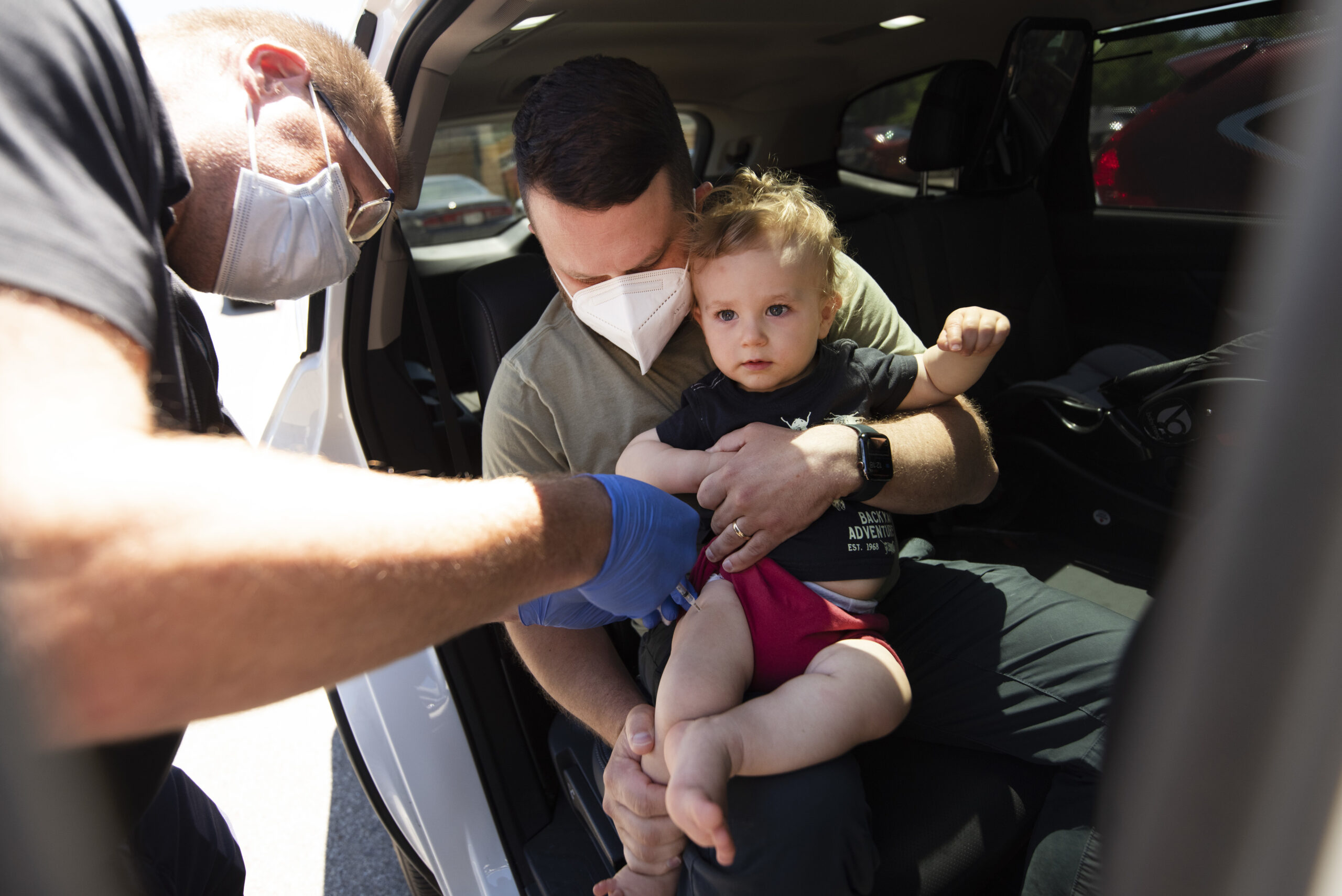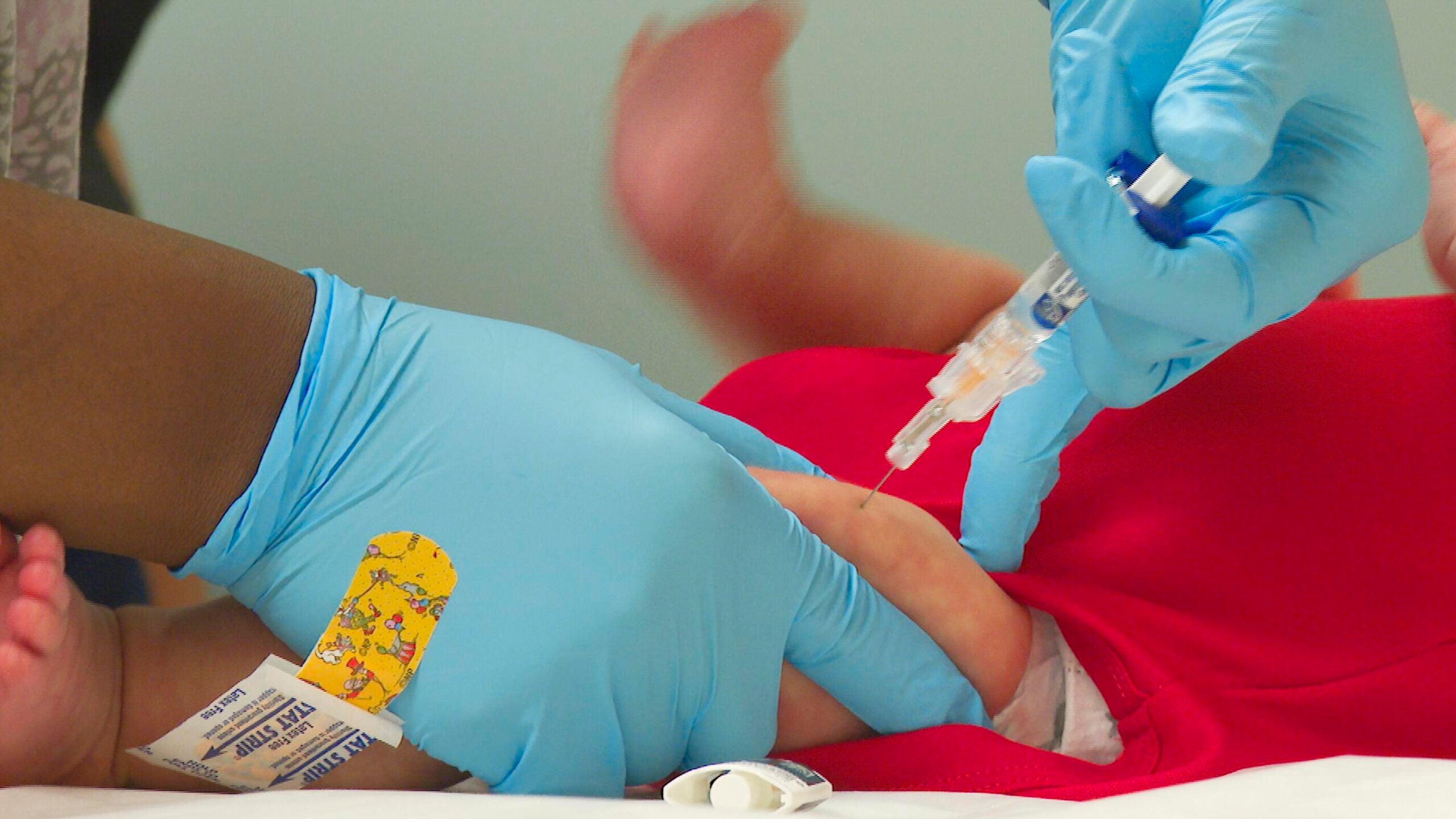When Heidi Steier and her husband go to the grocery store, one of them goes inside, masked, to shop, while the other waits outside in the parking lot with their 13-month-old son, Micah. They want him to see other people around and get a sense of the hustle and bustle, but they’ve been very cautious to protect him from COVID-19.
“That has been a little of a sad part for us — he loves people,” she said. “When there are other people around, he just gets so excited, he’s like a little ham showing off.”
Steier is a microbiologist, so when she and her husband made decisions about how to keep Micah safe, they turned to the data. Steier said the information released by the Food and Drug Administration in approving vaccines for children under 5 made her comfortable getting Micah an appointment for his first dose on July 6.
News with a little more humanity
WPR’s “Wisconsin Today” newsletter keeps you connected to the state you love without feeling overwhelmed. No paywall. No agenda. No corporate filter.
“When I was first vaccinated, when I was pregnant, that was a much harder decision because there was no data for pregnant women,” she said. “This felt like a much easier decision because there was data to look at.”
Still, she said, it can be hard to make only data-driven decisions when they involve the well-being of a tiny, fragile human.
“The night before I got my own vaccine, when I was pregnant, I sat crying on my bed, thinking, ‘Am I doing the right thing for my child?’” she said. “This is an emotional decision, too, it’s not just a logic science question either, so I totally get that people are hesitant.”
In Wisconsin, about 295,000 children under 5 are eligible to get a COVID-19 vaccine, according to the state Department of Heatlh Services, and 4,256 children ages 6 months to 5 years have received their first dose as of Friday.
Polling from before the vaccines were approved for the youngest children showed about 1 in 5 families with a child under age 5 were planning to get the vaccine right away, while the rest were more hesitant. When the Pfizer COVID-19 vaccine received emergency authorization for kids ages 5 to 11, some parents and guardians of older children also took a wait-and-see approach before vaccinating their kids.
One listener wrote in to Wisconsin Public Radio’s WHYsconsin saying his family is holding off on vaccines for now. His whole family had COVID-19 in January 2021.
“One parent saw long COVID symptoms onset seemingly after first (vaccine) dose in March (20)21,” he wrote. “Not taking the chance on further vaccinations until science can openly report side effects, critique results, give us balanced risk reward and assess without penalty.”
Kevin Jordan and his wife Maria were excited to get their 3-year-old daughter, Nina, her first dose last week. She’s been at a small in-home day care during the pandemic, but they wanted her to be vaccinated before starting preschool next year.
“While most families have moved on, we were still taking a lot of precautions until literally last Friday when she got her first dose,” Jordan said. “I’m grateful for that group of parents that rallied together to support each other when maybe a lot of the world moved on already.”
Jordan, who works in clinical research, said he kept up with vaccine news and information through publications like Nature and PubMed, scientists and doctors he trusted on Twitter, and a Facebook group called Immunize Under 5. It helped the family hold the line on taking precautions when others around them eased up.
“A lot of family, even, and friends were requesting to get together — especially family. It seemed hard for them to understand practices of not going to restaurants and eating outside, testing, masks,” he said.
It’s a frustration that Steier experienced with Micah, as well.
“We ask family to either mask in public or maintain isolation but most family doesn’t really believe it’s necessary, they’re kind of in the ‘pandemic is over’ mindset, so we’ve had some battles with family that wants to see him,” she said. “Not having to have that kind of fear or concern, or the fear of like I have to police things so much with family interactions, is something I’m really looking forward to.”
With their science and medical backgrounds, both parents were also thinking about the long-term implications of COVID-19.
“It wasn’t the illness I was that worried about, I know the likelihood of him being fine and surviving was high … We were more concerned about the long-term implications, because that’s just the big unknown,” Steier said. “I would have a really hard time if I didn’t take precautions and then suddenly he got an immune disorder from COVID. Obviously, that could still happen, but at least now I can say I’ve done everything I possibly can to protect him.”
Jordan pointed to studies that have linked COVID-19 infections to long-term effects such as brain shrinkage and heart damage, as well as long COVID.
Nina, he said, took her first dose like a champ.
“She just looked away for a second, prick, the jab was done, and she looked at us like, ‘Oh, this is it?’” he said. “(She) put on an extra sticker that said, ‘I got my COVID vaccine’ and was pretty much all smiles.”
Now that she’s gotten her first dose, Jordan said he and his wife are starting to think about what they’ll be able to do when she’s fully vaccinated. This past January, they took a family trip to Montana, driving the whole way.
“It would be nice, probably early next year January, maybe go on that Montana trip again, but fly together,” he said. “It’s a little easier to fly for an hour and a half than the 18, 17 hours of driving.”
People can visit vaccine.gov or dial 211 to find a free COVID-19 vaccine.







